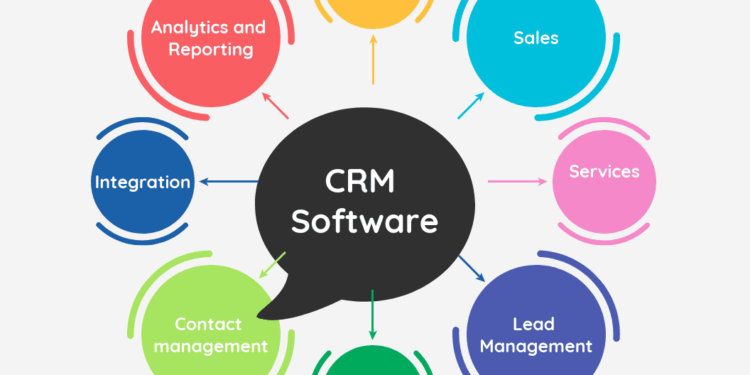Exploring the realm of CRM software, this guide delves into its significance and impact on businesses, offering a detailed look at the key features that drive success. Join us on this informative journey as we uncover the best practices and solutions in the world of CRM software.
Overview of CRM Software
CRM (Customer Relationship Management) software is a powerful tool that helps businesses manage interactions with current and potential customers. It is essential in today's competitive market as it allows companies to streamline processes, improve customer satisfaction, and boost overall productivity.
Key Features of CRM Software
CRM software offers a wide range of features that are crucial for businesses of all sizes. Some of the key features include:
- Centralized Customer Database: CRM software provides a centralized database where all customer information and interactions are stored, making it easy for employees to access and update data in real-time.
- Lead Management: With CRM software, businesses can track leads, manage follow-ups, and prioritize potential customers based on their level of interest.
- Automation: CRM software automates repetitive tasks such as sending emails, scheduling appointments, and generating reports, saving time and improving efficiency.
- Analytics and Reporting: CRM software offers advanced analytics and reporting tools to help businesses track performance, identify trends, and make data-driven decisions.
Industries Benefiting from CRM Software
Various industries can benefit greatly from using CRM software to enhance customer relationships and drive business growth. Some of the industries that benefit the most include:
- Retail: Retail businesses use CRM software to track customer preferences, manage loyalty programs, and personalize marketing campaigns.
- Real Estate: Real estate agents utilize CRM software to manage leads, track property listings, and maintain client relationships.
- Finance: Financial institutions rely on CRM software to manage client portfolios, track interactions, and comply with regulatory requirements.
- Healthcare: Healthcare providers use CRM software to improve patient engagement, schedule appointments, and enhance overall patient satisfaction.
Types of CRM Software
CRM software comes in various types to cater to different business needs and requirements. Two primary types of CRM software are cloud-based CRM and on-premise CRM solutions. Let's explore the differences and scalability of these options based on business size and needs.
Cloud-based CRM Software
Cloud-based CRM software, also known as SaaS (Software as a Service), is hosted on the vendor's servers and accessed through a web browser. It offers the advantage of being accessible from anywhere with an internet connection, making it ideal for remote teams and businesses with a mobile workforce.
Some key features of cloud-based CRM software include:
- Scalability: Cloud-based CRM software can easily scale up or down based on business needs, making it suitable for businesses of all sizes.
- Cost-effective: Typically, cloud-based CRM software operates on a subscription-based model, eliminating the need for upfront hardware and software investments.
- Automatic updates: Vendors handle software updates and maintenance, ensuring that businesses always have access to the latest features and enhancements.
On-premise CRM Solutions
On-premise CRM solutions involve hosting the software on the company's own servers and infrastructure. While it offers more control over data and customization options, it requires a significant upfront investment and IT resources to maintain and manage the software. Key features of on-premise CRM solutions include:
- Control: Companies have full control over their data and can customize the software to meet specific requirements.
- Data security: With data stored on-site, businesses can ensure compliance with industry regulations and security standards.
- Scalability challenges: On-premise CRM solutions may face scalability challenges, requiring additional hardware and resources as the business grows.
Overall, the choice between cloud-based CRM software and on-premise CRM solutions depends on factors such as budget, IT capabilities, data security requirements, and scalability needs. Businesses should carefully evaluate their options to select the CRM software that best aligns with their goals and objectives.
Key Features to Look for
When choosing CRM software for your business, it is important to consider the key features that will best meet your needs. These features can help streamline processes, improve efficiency, and enhance customer relationships.
Automation Tools
Automation tools within CRM software can greatly streamline processes by eliminating manual tasks and allowing for more efficient workflows. Features such as automated email responses, lead scoring, and task assignments can help businesses save time and focus on more important tasks.
Integration Capabilities
Integration capabilities with other business tools are essential for CRM software to ensure seamless data flow and communication across different platforms. The ability to integrate with tools such as email marketing platforms, social media channels, and accounting software can help businesses centralize their data and improve overall efficiency.
Popular CRM Software Solutions
When it comes to CRM software solutions, there are several popular options available in the market. These solutions offer a range of features and pricing plans to cater to the needs of businesses of all sizes
. Let's take a closer look at some of the best CRM software solutions and compare their key aspects.
Salesforce CRM
Salesforce CRM is one of the most well-known CRM software solutions in the market. It offers a wide range of features such as lead management, sales forecasting, and customer data management. Salesforce CRM is known for its user-friendly interface and scalability, making it a popular choice among businesses of all sizes.
The pricing for Salesforce CRM varies based on the specific features and customization required.
HubSpot CRM
HubSpot CRM is another popular choice for businesses looking for a comprehensive CRM solution. It offers features such as contact management, email tracking, and task automation. HubSpot CRM is known for its easy integration with other HubSpot tools such as marketing automation and customer service.
The pricing for HubSpot CRM is based on the number of contacts and users.
Zoho CRM
Zoho CRM is a versatile CRM software solution that offers features such as pipeline management, email integration, and social media marketing. Zoho CRM is known for its affordability and customization options, making it a popular choice among small and medium-sized businesses.
The pricing for Zoho CRM is based on the number of users and features required.
Microsoft Dynamics 365
Microsoft Dynamics 365 is a comprehensive CRM software solution that offers features such as sales automation, customer service, and marketing automation. It is known for its seamless integration with Microsoft Office applications and other Microsoft products. The pricing for Microsoft Dynamics 365 varies based on the specific modules and features required.
Conclusion
Each of these popular CRM software solutions has its own unique selling points and pricing structures. When choosing a CRM software solution for your business, it is important to consider the specific needs of your organization and the features that are most important to you.
By comparing the pricing, features, and customer reviews of these popular CRM software options, you can make an informed decision that will help streamline your sales and customer management processes.
Implementation and Training
Implementing CRM software effectively within an organization is crucial for maximizing its benefits. It is essential to follow best practices to ensure a smooth transition and successful adoption by all users. Training employees on how to use CRM software efficiently is equally important to drive user engagement and productivity.
Here are some tips for overcoming common challenges during CRM software implementation:
Best Practices for Implementation
- Define clear objectives and goals for implementing CRM software to align with the organization's needs and strategies.
- Involve key stakeholders from different departments to ensure buy-in and collaboration throughout the process.
- Customize the CRM software to fit the specific requirements and workflows of the organization to enhance user experience.
- Plan for data migration and integration with existing systems to maintain data accuracy and consistency.
Importance of Employee Training
- Provide comprehensive training sessions to employees at all levels to ensure they understand the functionalities and benefits of CRM software.
- Offer ongoing support and resources to encourage continuous learning and adoption of CRM software in daily tasks.
- Empower employees to explore and utilize advanced features of CRM software to improve efficiency and decision-making.
Tips for Overcoming Challenges
- Communicate regularly with employees to address any concerns or resistance to change during the implementation process.
- Monitor user feedback and usage patterns to identify areas for improvement and additional training needs.
- Provide hands-on practice and real-life scenarios to help employees apply CRM software knowledge effectively in their roles.
Ultimate Conclusion
In conclusion, the world of CRM software is vast and dynamic, with endless possibilities for businesses to thrive. By understanding the core features and benefits, organizations can harness the power of CRM software to propel their success to new heights.
Dive into the realm of CRM software and unlock its full potential for your business today.
Expert Answers
What are the key features to look for in CRM software?
Key features to consider include contact management, lead tracking, sales forecasting, and reporting capabilities.
How do automation tools in CRM software benefit businesses?
Automation tools streamline repetitive tasks, improve efficiency, and enhance customer interactions.
Which industries benefit the most from using CRM software?
Industries such as retail, real estate, finance, and healthcare benefit greatly from CRM software to manage customer relationships effectively.






